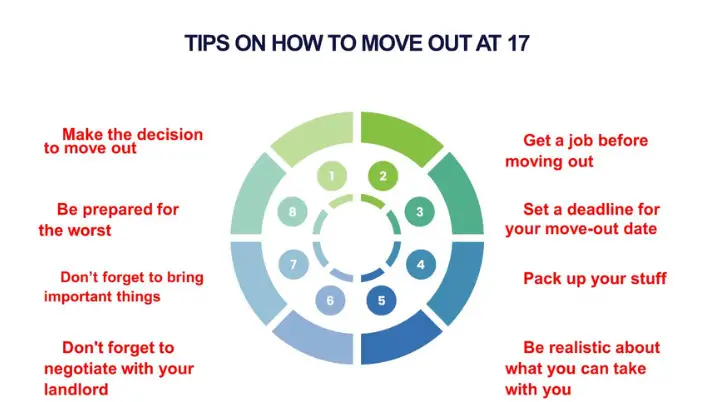Information presented on this web page is intended for informational and educational purposes only and is not meant to be taken as legal, financial, investment or tax advice. We do not accept any responsibility for any trading or investment related losses. Please review our disclaimer on before taking action based upon anything you read or see.
One of the hardest choices a young person can make is to leave home. There are several reasons for choosing to leave home at 17. You could want greater freedom, or you might need to relocate due to employment or school. Other teenagers decide to move out of their parent’s house because they don’t get along with them or are compelled to leave because of persistent abuse or violence. Leaving home is a significant shift regardless of your situation. Additionally, there are a few crucial factors you may need to consider while determining whether or not to move out. To help you, we have created this guide on how to move out at 17.
Additionally, if you are 17 years old or older, you may leave the house unaccompanied. Unless you are in danger, it’s unlikely that you will be ordered to return home. Generally speaking, leaving home before turning 18 is a bad choice. Before you go, attempt to acquire some advice if you’re in a difficult situation. Follow along as we go into more detail about this below;
- The decision to move out
- Get a job before moving out
- Set a deadline for your move-out date
- Pack up your stuff
- Be realistic about what you can take with you
- Pay off your share of the rent or mortgage
- Don’t forget to negotiate with your landlord
- Don’t Forget to Bring Important Things
- Be Prepared for the Worst
Is it Legal to Move Out at 17?
Not only do disobedient youngsters desire to know how to get independent. The emancipation of children and how it impacts their legal duties are other common discussion topics among parents and guardians. That being said, many American teenagers have undoubtedly wondered whether moving out at 17 is permissible. A judge must often rule that a youngster is mature enough to live alone at age 17 before moving away is lawful.
You should go to your local court to pursue legal emancipation after ensuring you comply with your nation’s criteria. During this procedure, you will have to provide proof of your financial situation and housing situation.
It is also essential to attempt to compromise with your parents or legal guardians. Try to understand with your parents or guardians if you want to leave home but do not want to become legally independent. Your family may support your wish to leave, depending on the situation.
Before truly considering the possibility of moving out, it would also be helpful to have a general concept of where you intend to remain. If feasible, think about moving in or living with someone else. Long-term isolation may be detrimental to your physical and mental health.
How to Move Out at 17
Teenagers often need to relocate for personal reasons due to life’s difficulties. For instance, there are situations when schools in another district provide teenagers higher advantages than the one in which the teenager lives. There are instances when a neighbourhood is preferable since the teenager is less likely to get into criminal problems there.
In either scenario, parents could decide that they should move out and perhaps live with a relative or close friend. The adolescent may not have a significant role in these situations. This is because they are still underage in the majority of states. That’s why we’ll give you tips on moving out at 17. They consist of:

Decide to move out
It’s a significant choice to leave your parents’ home before you turn 18. You can be considering moving out for various reasons, depending on where in life you are at the moment. Consider your alternatives carefully before making extreme decisions so you may leave safely and lawfully.
Find out your nation’s legal majority age first. Consider formal emancipation if you desire to leave home and live independently of your guardians or parents. Most countries consider 18 to be the legal majority or age of independence. Despite this, certain locations allow for emancipation exceptions without a protracted judicial procedure.
Being married at seventeen may immediately emancipate you in several jurisdictions. In certain countries, joining the military before you turn 18 may entitle you to emancipation. Your guardian or parent must assent to your desire to become emancipated since they will probably need to sign permission paperwork in the future.
Get a job before moving out.
You must demonstrate to the court that you have a source of income to be allowed to move out at 16. It’s crucial to remember that children are subject to particular child labour rules, which forbid them from putting in long hours. Additionally, finding work before mobbing out will enable you to pay your immediate and long-term expenses.
Set a deadline for your move-out date
Make a relocation plan you and your parents can accept before leaving your parents’ home. We advise setting a target date for when you anticipate being able to move out. Although this is only a starting point for you and your parents, it does not obligate you to leave by this time.
Timing is a factor you should consider when deciding when to move out. This will serve as a reminder, so you don’t miss any crucial deadlines.
Timing is crucial in this situation since you don’t want to be left without a place to reside. Alternatively, if you’re between homes, you’ll need to ensure the moving company will retain your belongings or that you have enough storage space until you can move in.
Pack up your stuff
Another vital part is packing. We advise getting friends or experts to help you relocate unless you have little to move. If you’re planning a DIY move with friends, think about hiring a moving truck from a trustworthy provider.
You may employ labour-only movers to aid with the loading and unloading the rental truck if you want to engage experts to help with certain aspects of the relocation. Doing this will undoubtedly be cheaper than hiring full-service movers to manage the relocation on your behalf.
Plan the mover’s arrival as far in advance as you can. Moving at the last minute is more expensive than planning. Additionally, it could be harder to locate available movers on your dates if you wait too long. Looking to relocate a bit less expensively? Choose a weekday over a weekend to schedule your relocation.
Be realistic about what you can take with you.
Have a surplus of items? If your closets are overflowing, it may be time to get rid of some items before you move. After all, moving will be simpler (and less expensive) with fewer items you transport.
Consider giving lightly worn goods to a neighbourhood charity and consigning fancier items to consignment shops in your area. Also, consider holding a garage sale or selling your items on an internet marketplace.
You may want to contact a rubbish removal business if you have a lot of garbage to get rid of or bulky objects that you can’t give or quickly dispose of. The firm may remove unwanted beds, furniture, exercise equipment, and garbage. Inform your parents of your intentions so they may offer to divide the cost if they have any goods they wish to get rid of.
Don’t forget to negotiate with your landlord.
Make sure you are aware of your rights as a teen before you start bargaining. An excellent place to start is the Shelter website. You may use this information to understand better your obligations and the boundaries of your landlord’s obligations. Check what your lease agreement says, but don’t rely on it to be legally accurate or to include all the information you need to know.
The discussion may need to halt so that you may do further research or thoroughly consider your alternatives without being pressed. It could be appropriate to quit the discussion and try again later if the negotiation becomes tense and out of control.
If you get to a satisfactory deal, be polite and thank the other party. Don’t be ungrateful or push for more when you get the outcome you sought. There’s a good chance you’ll have to bargain with them again.
Don’t forget to bring important things.
As soon as you have gathered all of your goods, start packing. Packing non-essentials last is what we advise. These ought to be the things you won’t need in the next few days and weeks. Examples include seasonal apparel, trinkets, pictures, novels, etc.
Essentials like toiletries, pyjamas, prescription medications, and other items should be packed the day before you move and place in a simple box to locate on moving day. All boxes should be neatly labelled, and you should always have access to crucial papers.
You may hire packers to help you package your belongings if you’re short on time or need additional assistance. They’ll do it faster than you could; pack your belongings carefully, and bring packing materials. You may anticipate paying them by the hour and the number of workers deployed to do the task.
Be prepared for the worst.
You’ll be shocked at how quickly your money disappears when you live alone. As a result, it is important to be completely ready for the worst. Keep in mind that it could be a little pricey at first.
However, you may always get assistance from family and friends. This could involve cash support or used dishes and furnishings. You may also shop around, and after you have your basic setup in place, keep adding décor as time and resources permit.
Furthermore, the tips on how to move out at 17 have been highlighted in the infographics below.
Where can I work if I am a minor?
First of all, we recommend that you subscribe to the job center. It is very simple. Go to the nearest employment office and tell them about your situation. Here is a list of jobs you can do while you are looking for a stable position:
Complete online surveys
The pay depends on the company conducting the survey. It is usually not a lot of money. However, you can do it from your cell phone, which is free.
Engage in social networking
You can record your empowerment experience and upload it to social networks like YouTube. Make several videos, like episodes, talking about everything you’ve been through. You’ll make money through advertising and collaborations with brands.
Seasonal employees
Christmas, summer or sales are the times when there are more customers. Therefore, companies need more staff.
Sell what you don’t use.
Surely you have clothes, books, toys, etc., barely occupying space. Sell them to other people.
Sell your crafts
If you are good at painting, try selling your designs, stickers, badges, or creations. If jewellery is your thing, sell that too. The options are endless.
Take care of others
You can babysit or care for the elderly. Start by interviewing your neighbours or acquaintances and advertise online.
Give private lessons
If you are fluent in languages, math or know how to play an instrument, be a private tutor.
How to Handle Emancipation?

Being independent has its complications. Many can’t do this before 30 – imagine being a teenager. But if you’re younger and determined, we encourage you to pursue your dreams. Now comes the tricky part: talking to your parents. To help you, we’ve put together a little guide to make it a success.
Show your parents you’re ready. Before leaving home, you must show your parents that you’re mature. Find a job, clean, cook for everyone, save money and discover your worth.
Earn their trust
The best way to have your parents on your side is for them to trust you. Make them feel they know their child well enough to trust them. Avoid conflicts or resolve them calmly. Help them with whatever they need. Please don’t make them worry about you. Talk to them openly and have fun with them.
Create your plan
Getting out of the house is not like going for a walk. It would help if you had a well-thought-out long and short-term plan. Do all the necessary research on budget, rents, supplies, and employment. To convince them, you must appear rational and have a solid plan.
Talk to them
Once you’ve paved the way, it’s time to have the conversation. Gather them together when they are calm and willing to listen. Start by reminding them that you are in charge and everything you have done to prepare. Please show them your plan, budget, and money saved and explain honestly and calmly why you want to be self-employed.
Don’t expect to be accepted the first time.
They will ask you many questions, get angry, or deny the idea. Take it slow. You have to understand that you are their child, which is even harder due to age. Stay calm and give them time to think.
If you have a problem at home, the best thing is to go to another adult or even the police.
How Can I live on my own as a Minor?
Governments offer grants to young people from 16 to become self-employed in other countries.
Here are some tips:
- Keep your feet on the ground. The salary you earn surely won’t be rocket launching. We all want to live in nice neighbourhoods and nice apartments, but you can’t afford it. Tailor your research to what you can afford.
- Share an apartment. It’s silly to leave your parents’ house and share a house. But renting a room is much more cost-effective than a whole apartment. You may be able to afford to live in a better area since all expenses are shared, and the rent is not very high—the more people you have with you, the cheaper.
Read More: How to Live on Your Own
Frequently Asked Questions
Can my parents force me to stay home at 17?
Yes, they can, unless you apply to the cases, you saw at the beginning of the article. They have custody of you, so it is important to wait until the age of majority to emancipate you. Child Safety is an important issue that no young person should ignore.
Can my parents call the cops if I leave at 17?
Yes, they can because you are a teenager and must look out for your safety. However, remember that emancipation can be granted with parental consent. You have to apply for it and access the legal benefit. Remember that, in the UK, this applies from the age of 16. However, check the local laws where you live for more details.
Can you go to jail for running away at 17?
Your parents could ask the police to detain you as a preventive measure. However, each of these scenarios will depend on your country. The laws treat you very differently depending on where you live. That is why it is important to have good communication with your parents.
Is a parent responsible for a 17-year-old?
Unless there is an emancipation order, custody is your parents’ responsibility. They are your caretakers when it comes to looking after your safety. So your parents are responsible for your welfare until you turn 18.
Learn More: Can you live by yourself at 17 with Parental Consent
What do you do when your 17-year-old doesn’t come home?
The first thing to do is to try to communicate with the young person. If you cannot be in contact with the youth, you should call the authorities. This is very important because parents are the ones who handle the custody of their children when they become teenagers.
Learn More: How to Live on Your Own as a Teenager
Is it normal to move out at 17?
Yes, that is a very normal process. Some young people like to be independent at a young age. They should support their children in making the right decision. Family and communication are very important elements to take into account. Your parents are the legal guardians of your custody. From when you are in school to when you are looking for answers to your life, your parents are a fundamental part of that process.
At what age can I kick my teenager out?
Remember that legally there are several requirements to be met for emancipation. If the teenager does not have the decree of more and passion in your hands, you can evict him/her from 18. To do it before would constitute a crime in any country. It is necessary to avoid any issues and, at the same time, to avoid the boy using the services, not social housing.
Final Words
Young people need to think carefully about every decision they make about moving. Everyone is the master of their destiny, but the best thing about this process is that your parents can legally accompany you. A decree of emancipation by consent is one of the best solutions to young people’s desire for independence.
So as we hope you can read this article again and see all the advantages of emancipation. Parents should also accompany their children in each of these processes. Many young people who reach the age of majority seek to be independent. This is not bad if they have the support of their parents and the right circumstances.
This decision requires a lot of meditation and, at the same time recognizing the role of the youth’s guardian during their growth. You should respect each young person’s legal rights, and at the same time, they should be guided in the best way to be quite independent.
Expert Opinion
Having disagreements with your parents is terrible and maybe a huge pain in the family ties. You may be able to receive assistance to solve the issues if you don’t get along with your parents, such as mediation and counselling. If nothing can be done, you’ll need to consider the housing options and your budget at 17.
Additionally, since leaving home is such a big choice, consider all your alternatives before moving forward carefully.
References
- https://en.wikipedia.org/wiki/Emancipation
- https://www.courts.ca.gov/selfhelp-emancipation.htm?rdeLocaleAttr=en#
- https://www.empoweringparents.com/article/when-your-teen-says-im-almost-18-you-cant-tell-me-what-to-do/
- https://www.southernearlychildhood.org/what-age-can-you-move-out-with-parental-consent/





